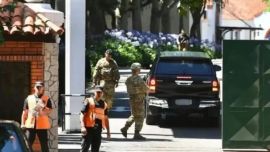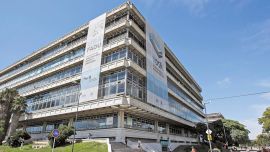For months, the members of Argentina’s intelligentsia has asked President Mauricio Macri and his closest advisors to revise their decision-making strategy, opening up the game plan to their political allies and engaging in active debate and negotiations with the opposition. Even within the ruling Cambiemos (Let’s Change) coalition, dissident voices called for “more politics,” which translates roughly into dialogue with multiple sectors, coupled with better communication of their intended policy framework. Macri’s governing strategy, so the argument went, was to fragment power among multiple ministries run by efficient but uncharismatic technocrats who – the most cynical would claim – were politically untenable to the point where they would never be able to dispute power with the president. That would explain the early exodus of high-profile officials like former economy minister Alfonso Prat-Gay and Carlos Melconian, ex-president of the Banco Nación.
This year’s violent devaluation forced Macri and Cabinet Chief Marcos Peña to temporarily re-evaluate their strategy in September, when a cosmetic change to the Cabinet led to a reduction in the number of ministries, leaving just one official outside the Casa Rosada, Deputy Cabinet Chief Mario Quintana. At the time, many expressed optimism at the “return of the political table,” as Macri summoned the likes of Ernesto Sanz — responsible for bringing the Radical Civic Union into Cambiemos, which helped Macri secure the presidency — and Emilio Monzó, the speaker of the Chamber of Deputies.
But those high hopes were short-lived as Macri’s inner circle closed in on itself again. Buenos Aires Province Governor María Eugenia Vidal and City Mayor Horacio Rodríguez Larreta took it on themselves to negotiate with the so-called ‘rational Peronists’ (those opposed to former president Cristina Fernández de Kirchner, who, paradoxically, were all subservient to her in the recent past).
What , exactly, does the political Macri look like? The traumatic experience that was the devaluation of the Argentine peso, vis-à-vis the US dollar, since December appears to have come to an end with the departure of Nicolas “Toto” Caputo from the Central Bank. October was a month of monetary peace, with Guido Sandleris managing monetary policy from the Central Bank but the International Monetary Fund really in control of macroeconomic policy. Economic actors have already accepted that inflation could hit 50 percent this year, while a painful recession will last well into 2019.
Thus, Macri’s coalition spurt to action with the first of several necessary goals: passing the 2019 budget through Congress. In the Chamber of Deputies, with Monzó and Interior Minister Rogelio Frigerio, Cambiemos once again demonstrated that Kirchnerism remains a radicalised faction, passing the bill with Peronist support. Yet, it wasn’t free. The government is committed to putting an end to the fiscal deficit next year, meaning aggressive belt-tightening – which hurts not only the national government but also the provinces, particularly Buenos Aires. In exchange for the support of 11 Peronist governors, Macri paid 18 billion pesos to finance public works or discretionary disbursements in different provinces. This also meant Vidal’s battered Buenos Aires Province had to give up on its claims to a 19-billion-peso debt owed by the federal government. The sacrifices of guaranteeing governability.
In the Senate, Macri’s political team were forced into an uncomfortable alliance with Miguel Ángel Pichetto, who many see as a potential runningmate to whomever decides to run in 2019 bearing the Peronist coat of arms. Pichetto, a political chameleon like his party, runs the Senate, and after agreeing with Frigerio has taken up the battle against the more fundamentalist Kirchnerites in the Senate (rallying behind Fernández de Kirchner) in order to push through a positive vote on the budget. This wasn’t a matter of choice or necessity: Pichetto and the governors pushed for as many concessions as they could get, but it’s better for them to approve a budget rather than allow the Casa Rosada to discretionarily control the state’s finances during an electoral year. And for Macri, he was forced not only to fork out billions of pesos, but also to cede the political initiative to a sector that is looking to push him out of power.
Parallel to the legislative goings on, the powerful bout of stagflation has severely eroded purchasing-power, with automatic salary increases becoming dramatically outpaced by inflation. In parallel, small- and medium-sized business are struggling as economic activity has fallen off a cliff. Thus, the social climate in Buenos Aires has been dense, and union leaders have taken the opportunity to antagonise Macri. The city’s main artery, Avenida 9 de Julio, is packed with protesters several days a week, as corrupt thugs like Hugo Moyano give empty speeches about defending workers’ rights, looking to leverage the reality of the current economic disaster to buy indemnity from corruption investigations. The result: Production and Labour Minister Dante Sica reached an agreement with the General Confederation of Labout (CGT) and certain business sectors for a compulsory 5,000-peso bonus for private-sector workers to be paid in November and January. The draft of the presidential decree was leaked to the press, with which Macri bought his way out of an embarrassing general strike on the eve of the G20 summit later this month, which will count with the presence of Donald Trump, Vladimir Putin, Theresa May, and Xi Jingping, among others.
The political Macri, then, is a president who concedes to his opponents, even against his ideological position, prioritising the pragmatic solution. Yet, two things connect his negotiations in the Chamber of Deputies, the Senate, and with union leaders: Macri never led the conversation and in every case he was forced to pay to play. Which begs the question, is engaging in politics always about distributing cash to those ideologically opposed in order to generate agreements? And if this is the case, then is the early Macri who espoused gradualism and increased social spending the same political Macri we are seeing now?
It is impossible to know “who the real Macri” really is. It is probably the one who appeared after the 2017 midterm elections, with tough rhetoric against the opposition and the intention to strong-arm his reforms through Congress looks a lot like the real thing. The same one who told reporters in off-the-record conversations that he would’ve been a lot more aggressive in terms of austerity during the first two years, and who has an engineer and a businessman’s view of things. Until the real Macri stands up, or until the economy really picks up, a weakened and diluted version will continue to spend on his political opponents in exchange for governability.



















Comments